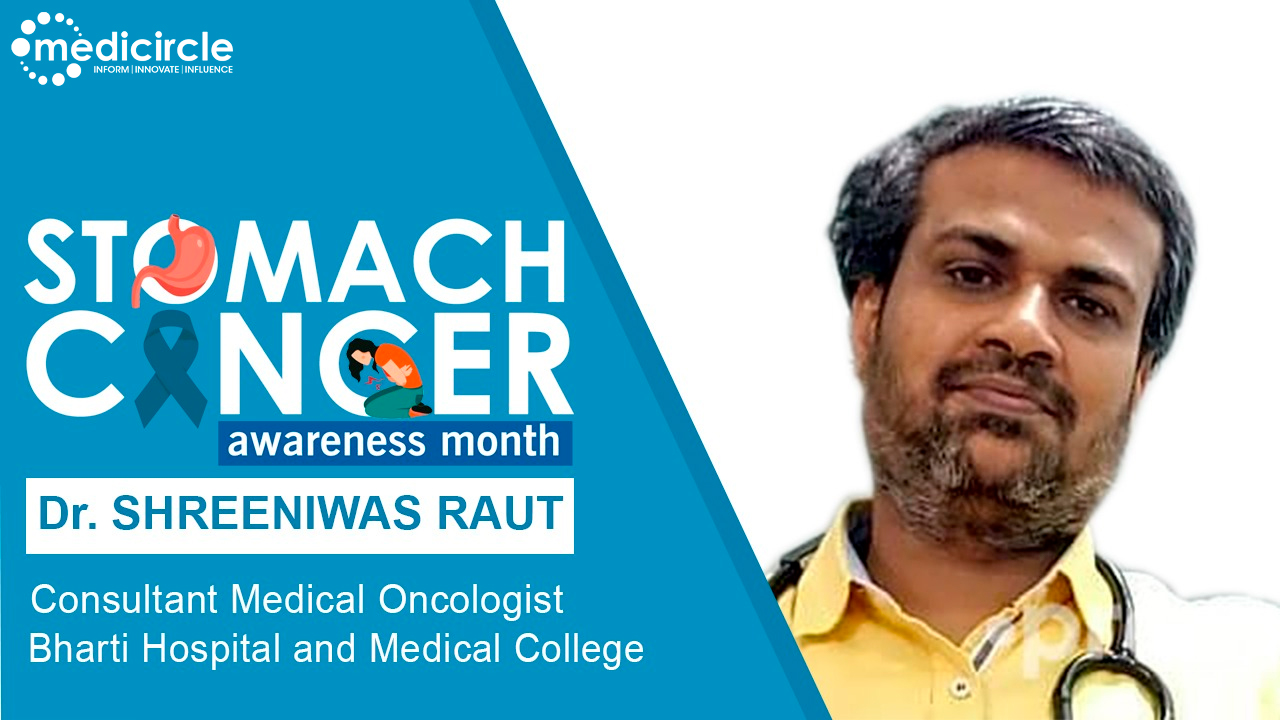Stomach cancer, also called gastric cancer, usually begins on the inner lining of stomach walls and then penetrates deeper into the stomach walls as cancer develops. The tumor may grow to involve nearby organs like the liver and pancreas. The incidence of gastric cancer in India is low compared to developed countries. Gastric cancer is the fifth most common cancer among males and the seventh most common cancer among females in India. The incidence of gastric cancer in Mizoram has been reported to be the highest in India.
November is celebrated as Gastric cancer awareness month. The main cause of stomach cancer is a genetic mutation (change) in the cells of the stomach, which causes the cells to grow rapidly and eventually form a tumor. Symptoms of stomach cancer include indigestion, heartburn, nausea, loss of appetite. We at Medicircle are conducting the World Stomach Cancer Month Series to bring awareness and educate people about healthy cancer cures and prevention especially after the pandemic wave.
Dr. Shreeniwas Raut is currently working as a Consultant Medical Oncologist at Bharti Hospital and medical college, Pune. He was earlier associated with HCG Ranchi and Paras Hospital, Patna. He is expertise in adults and Pediatric medical oncology, Chemotherapy, Bone marrow transplant, Hemato Oncology.
Stomach Cancer
Dr. Shreeniwas describes, “Cancer is the uncontrolled growth of abnormal cells anywhere in a body. Normal cells grow in a controlled manner. Anything that may cause a normal body cell to develop abnormally potentially can cause cancer. Most cancers of the stomach (about 90% to 95%) are adenocarcinomas. These cancers develop from the gland cells in the innermost lining of the stomach. Other cancers of the stomach are – Neuroendocrine tumors and lymphomas. The stomach wall has 5 layers – mucosa, submucosa, muscularis propria, subserosa and serosa. These layers determine different stages of cancer – I, II, III, IV. To know the exact stage, CT scan and MRI are generally performed.
Causes of stomach cancer
Dr. Shreeniwas lists out some causative factors Inherited genetic mutations in some genes can increase a person’s stomach cancer risk. Consumption of carcinogenic foods – smoking, high salt food, improperly cooked food. H pylori bacteria can convert substances in some foods into chemicals that cause mutations (changes) in the DNA of the cells in the stomach lining. This causes chronic irritation. If there is a family history of any type of cancer like breast cancer or esophageal cancer, this also increases the risk.
Signs and Symptoms
Dr. Shreeniwas talk about some non-specific signs and symptoms of stomach cancer
Abdominal pain or stomach ache
Poor appetite, uneasiness
Heartburn or indigestion or bloating
Difficulty swallowing or eating.
Feeling full after eating small amounts of food
Blood in the stool or black stools
Vomiting, with or without blood
Preventive care
Dr. Shreeniwas expresses, “Conventional Indian diet is very useful in avoiding any of the problematic diseases.
Should not eat - Smoking, alcohol, fried foods, alcohol, junk foods, western diet, high salty diet, smoked foods, red meat, spices that irritate the gastric lining Should eat - High fiber and low-calorie diet, including green leafy vegetables and fruits. Take a balanced diet. Regular physical exercise
Treatment
Dr. Shreeniwas mentions, “Stage I, II, and III of any cancer can be treated with curative intent but stage IV is not curable (treatable). Based on biopsy and imaging, staging is done. Surgery can be performed for the first three stages. Depending upon the stages, first, we differentiate between operable and inoperable cancer. For I, II, and III stages, the curative therapy includes
Surgery Chemotherapy radiation Targeted therapy Immunotherapy
For stage IV, palliative chemotherapy (palliative targeted therapy and palliative immunotherapy) is recommended.
(Edited by Renu Gupta)

 Gastric cancer is the fifth most common cancer among males and the seventh most common cancer among females in India. Gastric cancer develops from the gland cells in the innermost lining of the stomach. Know the right preventive care for gastric cancer from an Oncologist
Gastric cancer is the fifth most common cancer among males and the seventh most common cancer among females in India. Gastric cancer develops from the gland cells in the innermost lining of the stomach. Know the right preventive care for gastric cancer from an Oncologist








.jpeg)











.jpeg)


.jpg)


.jpg)




.jpg)


